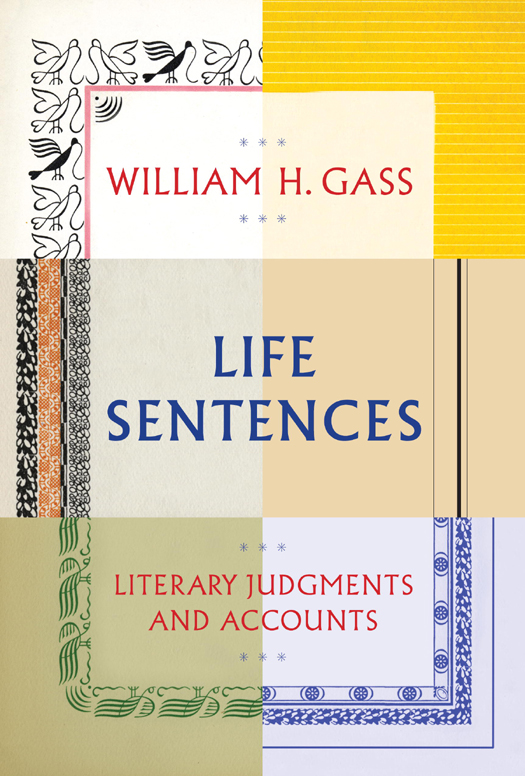
Life Sentences
Literary Judgments and Accounts
کتاب های مرتبط
- اطلاعات
- نقد و بررسی
- دیدگاه کاربران
نقد و بررسی

March 26, 2012
Essayist, novelist, and literary critic Gass (Cartesian Sonata) looks back on a long life of sentences in this thoroughly engaging book. In the quietly humorous "Slices of Life in a Library," Gass recalls learning "what provisions to smuggle in by briefcase" and his moral dilemma over whether to steal an overlooked first edition of Gertrude Stein's Tender Buttons. An academic air persists throughout, and though occasionally sentimental, Gass grounds each anecdotal essay in a germane world event, disposition, human flaw, or intellectual concern. Infused with a wistful melancholy, "Retrospection" sees Gass resuscitating some very early, amusing, poetical pursuits while musing on his own authorial habits, among them "jingling" and "whoring and metaphoring." In addition to ruminations on his own writing life, Gass also gives the greatsâgood and badâtheir due, genially and deftly deconstructing Proust, exploring the appeal of the mad philosopher by putting Nietzsche under the philological microscope, and offering his own take on the life of the controversial Nobel Prize-winning "Nordic Nazi" Knut Hamsun. "The Biggs Lectures in the Classics" are intimate and detailed in evaluating more abstract topics, such as form and metaphor. While these and other lectures are successful on the whole, one senses that some of the charm of occasion and place must have been lost in transcription. Though lacking a sense of flow, the erratic nature and unconventional narrative arc is appealing and not only warrants, but rewards revisiting.

December 15, 2011
A wry, mannered retrospective collection of essays by octogenarian Bass (A Temple of Texts, 2006, etc.). In these wide-ranging essays, the author embarks on considerations of the function of mimesis in Greek theater with the same stylistic devotion and plentitude as he does an exegesis of lust. In "Retrospection," a revelatory piece written at age 87, he admits that writing never came easily to him, yet creating metaphors was "unstoppable," as natural as "carp ris[ing] to a dimple of bread." (He lists seven personal "bad habits" in the same essay--e.g., naming, metaphoring, jingling, preaching, theorizing, celebrating, translating, all of which nicely percolate in other essays here.) The profound reading of this former philosophy professor is gorgeously in evidence--e.g., in his writing about Nietzsche, Kafka, Malcolm Lowry and Henry James, and in an excoriating look at the extent of Nazi Germany's legitimizing of murder. His essay on the "Nordic Nazi" and little-read Nobel laureate Knut Hamsun is a fascinating study of a soul-impoverished quisling. Bass also offers erudite but no less accessible reflections in a series of Biggs Lectures in the Classics. The author delights in a well-turned sentence, and the last section of this alluring collection diagrams some duds and some doozies--e.g., Sir Walter Scott's litany from Waverley, Chester Himes' tough-guy constructions in Run Man Run. As a philosopher, Bass confesses that his most cherished part of speech is the preposition, particularly of, meaning "those of possession and being possessed, of belonging and exclusion." Throughout, rhythm is the author's organizing principle, rendering his own sentences compelling, exacting and suggestive. Stately pronouncements from a master of the form.
(COPYRIGHT (2011) KIRKUS REVIEWS/NIELSEN BUSINESS MEDIA, INC. ALL RIGHTS RESERVED.)

August 1, 2011
Winner of more awards than can possibly be listed, including three National Book Critics Circle awards for his criticism, Gass is a critic's critic who makes us rethink our every act of reading. Here he's both deeply scholarly and deeply personal, discussing beloved writers (e.g., Kafka, Proust), issues (from the Holocaust to form and metaphor), and the humble sentence. For anyone serious about literature.
Copyright 2011 Library Journal, LLC Used with permission.

Starred review from January 1, 2012
The pleasures in Gass' (A Temple of Texts, 2006) new powerhouse essay collection are heady, varied, and many. Now in his late eighties, the philosopher-writer is more frolicsome than ever in his fathoms-deep erudition and purring, stalking, and fencing prose. Gass writes so cogently, robustly, and puckishly about literary, metaphysical, and moral matters because he knows his subjects down to their subatomic particles. He happily reports that he relished the diagramming of sentences as a grade-school student, hence his dynamic lectures-become-essays on sentence structure, the anatomy and history of the metaphor, and Platonic forms. Having profoundly internalized Kafka's work and life, Gass imagines Kafka writing a memoir-from-beyond, in which he corrects biographical misperceptions. Further musings on the pitfalls of literary biography engender a vivid portrait of Katherine Anne Porter and an exultantly expert solution to all the speculation about Henry James' sexuality. Gass is mischievously insurgent in Lust, reordering our definitions of vice and virtue. A set of piquant personal essays includes reflections on the Fourth of July, tyranny and freedom of expression, and Slices of Life in a Library, a charmingly comic homage to the joys and misdemeanors of passionate reading. The brainy, ethical, artistic, and ebullient fun Gass has in this brimming volume will exalt every ardent reader.(Reprinted with permission of Booklist, copyright 2012, American Library Association.)

























دیدگاه کاربران